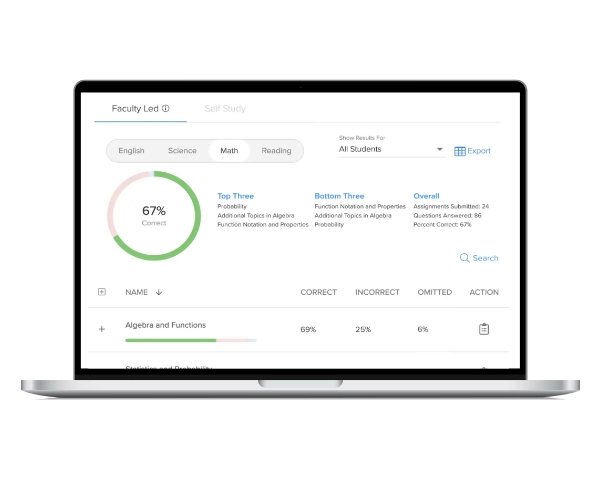This spring, more than 2 million students will take the AP exams, challenging their analytic and critical thinking. The exams are a culmination of months of hard work and study, and an opportunity for motivated and prepared students to do their best work.
For the most part, students who take AP courses are high achievers who believe they must pass the exam. But is that any indication they will pass?
As the rigorous AP exams approach, the following questions nag teachers and administrators:
- How can administrators be sure AP teachers have the tools they need to prepare students to do their best?
- Is there a way to predict how a student will perform on the exam?
- If students are falling behind, how can teachers intervene early enough to make a difference?
Helping educators move to a proactive confidence level requires planning and state-of-the-art tools. “So many high schools follow the traditional approach we’ve all followed,” said Phillip Bates, Director of College Readiness at UWorld. “After you’ve finished teaching the content in March and April, you then give students the AP practice test. At that point, you realize some may still need help.”
As a former high school administrator, Bates understands the anxiety and stress felt by teachers and students alike. “At this point, it’s a guessing game and one of hope—where do we go from here, other than repeating what we’ve done? Back when I was on campus, I knew that if educators had more data along the way, we could do better, know sooner, and help kids before they got too far along in the semester.”
Educators at America’s high schools want information—not hope and guessing—to help their students succeed. It’s evident they need resources to help them identify struggling students and strengthen their skills in time for the AP exams. One school of thought suggests that data gathered from student testing is the key.
Dr. Nancy Watkins, Assistant Professor in the Educational Leadership College of Education at California State University, Fullerton, is a firm believer in using data to assess where an AP student is in their progress. “Progress monitoring is a source of valuable information for educators,” Watkins said. “Teachers may make assumptions about a student’s prior knowledge in a content area without understanding or assessing what might be missing or needed for students to move forward in their learning.”
Sherry Martin, who teaches at Carroll Senior High School in Texas, agrees. “Checking on every student at the conclusion of every topic is critical,” Martin said. “I want every student to feel successful from the get-go. If they struggle in unit one, I want to know and address it then and there before I move them to the next unit. When I have data and reports at every stage, I can do my best job at helping them prepare and pass the exam.”
Let’s explore how educators can ensure a high rate of success for their students when they take the AP exam in May. Asking yourself these questions could help you arrive at some clarity—and develop a robust game plan.
What do teachers need to confidently prepare students for AP exams?
According to Bates, Martin, and other AP educators we spoke to, it begins with a high-quality instructional resource, which must be aligned with the course and exam. It must also be up to date, easy to use, and suitable for a broad range of students.
Instructional leaders need resources that:
- Provide immediate feedback to students;
- Give students detailed explanations that reinforce correct thinking and clear up misconceptions;
- Include performance reporting, including how students performed on practice tests, what concepts they mastered, and where they are struggling; and
- Include reporting that leads directly back to the content and provide immediate tools to support differentiating instruction (AP teachers are well versed in data analysis, but they need the available resources to pull from for reteaching).
Martin can attest to these needs and stated that she found the right resource in UWorld’s Learning Tools for AP Courses.
“Access to AP-style test questions is crucial to preparing students for success on their College Board exams,” she said. “UWorld’s resources are great for making online unit pre-tests. The question sets are excellent for group discussions during class. It is easy to create and grade individual student assignments. The questions for each unit are well written, concept-based, and provide excellent unit exam options. Our students have become stronger, more confident problem-solvers after the addition of this resource to our course. “
What’s the single most important thing to look for in exam prep tools?
Administrators tell us they need to know how students are progressing to effectively support instruction at the right time. According to Bates, the best way to effectively measure student progress is by analyzing student data from assessments aligned with the course and exam. He stressed that having consistent student data requires a practical exam prep tool.
At the UWorld College Readiness department, Bates leads a team of more than 30 former AP teachers and tutors, many of whom are current graders of those exams. This experience allows the dedicated team to stay close to teachers and students; they also know what to expect regarding AP teaching, learning, and testing.
Unit tests within UWorld’s Learning Tools for AP Courses enable instructors (and administrators) to see where students lag behind by topic and even sub-topic. Educators can then provide additional instruction or diagnose a curriculum gap and go back and analyze the content they teach.
Detailed explanations also help students understand complex concepts so they can critically apply what they’re learning to the exam.
“UWorld AP Unit Tests measure student progress starting with the first unit of the course and continuing throughout the year,” Bates said. “These carefully crafted assessments, created by former AP master teachers, are aligned so precisely with the course that the student data points inform not only classroom performance but also ultimate AP exam performance.”
Reflecting on some of the pain points reported by administrators, Bates continued, “School administrators have a limited amount of time and resources, and having data to drive decision-making helps them know exactly where to deploy those limited resources. With student data from each unit, campus leaders never have to wonder where students stand or how they are progressing.”
So, does this approach of monitoring and checking student progress beyond the AP practice tests help educators know if their students are ready to pass the test, and ultimately, improve that probability?
According to Martin, who has been using the UWorld’s AP products consistently, the answer is a resounding yes. “Over the last two years, I have about a 96 percent pass rate in AP Biology,” she said. “The unit tests and the information they provide are key to this success.”
UWorld’s Learning Tools for AP Courses offer hundreds of challenging practice questions, detailed answer explanations, teaching tools, and performance tracking designed to make AP courses easier to understand for students and manageable for teachers. Learn more about these online resources here.




